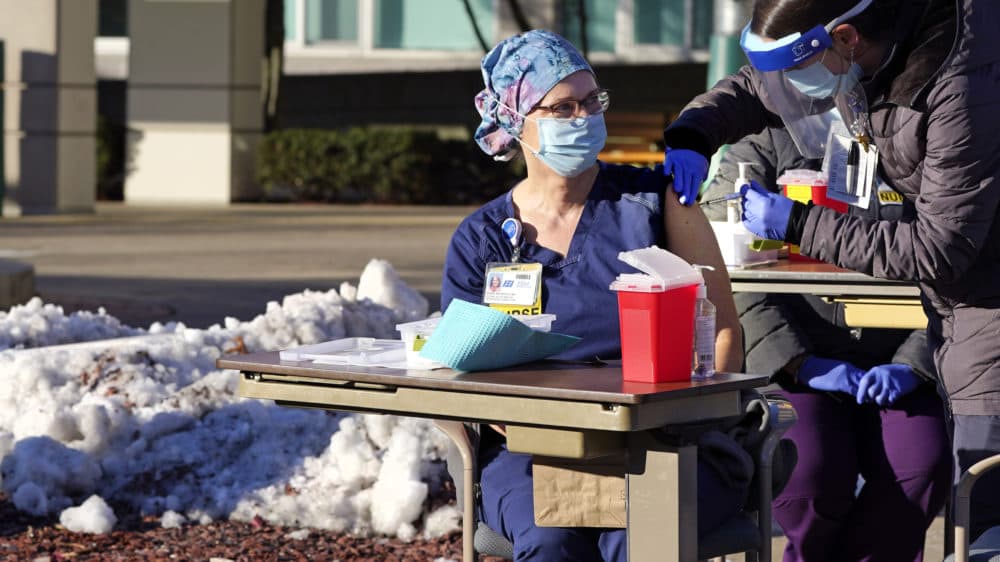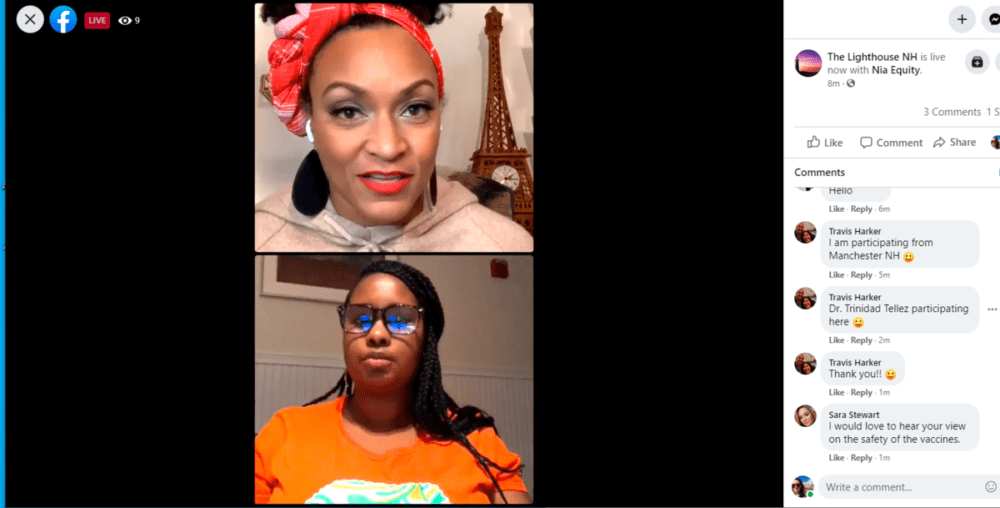Advertisement
Coronavirus Coverage
How Community Leaders In N.H. Are Working To Build Trust In COVID-19 Vaccines
Resume
It’s a Saturday evening, the day after Christmas, and public health advocates Nia Smart and Marie-Elizabeth Ramas are getting ready to broadcast live on Facebook from their homes. They’re hoping people will sit down in front of their laptops and engage in a pretty atypical holiday conversation — about vaccines.
The event, titled “Word on the Street,” is a segment from a new grassroots project called The Lighthouse NH. Its goal is to get more reliable public health information to communities of color in the state by meeting them where they are: on social media.
“It’s still okay to have an uncertainty about this vaccine," Smart said. "And that’s what we’re here for. To talk about these things and to provide some of these resources."
In New Hampshire, and nationally, while people of color are disproportionately impacted by COVID-19, surveys show they’re also more hesitant to get vaccinated against it. Ramas said that’s because of a long history of medical racism.
“The medical community has not given the community of color really a lot to trust," she said. "We have the Tuskeegee trials; we have in the slave times when people of color were taken advantage of and researched upon. So we understand that there’s this push and pull.”

Other concerns include the potential cost of the vaccine and its safety due to quick development. Among Black and Latinx adults, there's broad distrust in government and medicine, and for some immigrants, the fear of being tracked by federal officials.
The massive undertaking of distributing this vaccine quickly and equitably will be one major challenge for officials - but so is getting people to trust it. While trust in the vaccine has grown over the past few months, a wide range of people say they are still skeptical.
In a recent UNH Survey Center poll, 78% of people who identify as non-white in New Hampshire said they would "probably not" or "almost certainly not" get the COVID-19 vaccine; Republicans are less than half as likely as Democrats to get it; and in the North Country, a third of survey respondents said they would "almost certainly not" get vaccinated.
So what’s the best way to build trust among people who are already skeptical?
Dr. Melissa Martinez-Adorno, an OBGYN at Southern New Hampshire Health, has been making sure COVID-19 vaccine information is available at her hospital in diverse languages. She’s already started getting the word out herself through local Spanish media.
Martinez-Adorno was also one of the first people in the state of New Hampshire to get vaccinated publicly.
“My hope is that as Latinos see that I, as a Latina who has four children and who just kind of came from the same kind of background ... to be able to model the behavior of receiving that vaccine, I think that’s step one," she said.
That seemed to be effective among Martinez-Adorno’s patients. She says since she got her shot, she’s gotten a lot of questions, and many said that seeing her getting vaccinated mattered to them.
For those who live in more rural parts of the state, something as simple as seeing a photo of health workers within their own small communities getting vaccinated can be effective, said Kris van Bergen-Buteau of the North Country Health Consortium.
“A nurse that I worked with for years and have great respect for was smiling as she sat in a chair wearing an ‘If I survived breast cancer I can survive COVID’ shirt, and getting her vaccination," she said. "And I’ve been one of her patients, so it creates this sense of, 'this is gonna be okay.'"
The same UNH poll found that getting good information out through a trusted source might help convince someone to get vaccinated. But trusted sources can differ from community to community: it’s not always a local government official, or even a doctor.<
So while the state is working on its own public information campaign, Kirsten Durzy of the New Hampshire Division of Public Health Services says the state recognizes that. That’s why she, alongside the state's COVID-19 equity task force, is creating programming for all kinds of community leaders. She hopes it might reach people like faith leaders, immigration advocates, and grassroots organizers.
“Then they can in turn go out and share that information in the best way that they know how with their communities," Durzy said.
The first of those educational sessions will begin in early January, a few months before the vaccines begin to move toward the general population.
This segment aired on January 5, 2021.